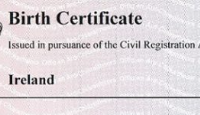
Somali Marriages, Divorces, and Birth Registration Create Challenges in Ireland Horn of Africa Community Center – Dublin Abdiaziz A. Mussa
Introduction: The increasing number of Somali marriages and divorces in Ireland has raised complex issues within the Irish legal system, particularly affecting the Child Registration Office in Dublin. The Horn of Africa Community Center of Ireland has encountered numerous complaints from Somali mothers facing legal uncertainties due to the intricacies of these unions. This situation underscores the necessity of understanding the intersection of Somali culture, the aspirations of modern Somali youth, and the challenges they encounter while navigating the Irish legal system.
The collapse of the Somali Republic in 1991 had a profound impact on the country’s social fabric, including its marriage practices. The absence of a central government and the ensuing political turmoil led to a breakdown in traditional systems of governance and administration. This, in turn, had a significant impact on how marriages were contracted and recognized.
In the absence of a formal legal system, Islamic marriage became the primary form of marriage among Somalis. This type of marriage is based on the consent of the woman, her parents, and two witnesses, and is conducted by a religious leader. Islamic marriage is considered legally binding under Islamic law, but it is not recognized by irish Goverment
A Complex Challenge: A primary issue confronting Somali families in Ireland arises when women, having registered their marriages in Somalia, later divorce upon arriving in Ireland. Subsequently, some of these individuals enter into new relationships and marriages without adhering to the legal procedures recognized by the Irish system. This leads to complications concerning child custody and the legitimacy of marriages.
At the core of this issue is the child registration process and the recognition of parental status in Ireland, often conflicting with Somali marital practices. A notable case illustrating this problem involves a Somali woman, referred to here as X, who struggled to register her Ireland-born child. X, previously married in Somalia and registered as such in Ireland, entered into a relationship with another man in Ireland, leading to the birth of a child. Her attempt to register the child’s paternity with her current partner was complicated by her ex-husband still being officially recognized as her spouse in Irish immigration records. Consequently, the Dublin registration office refused to register the child under the current partner’s name because he was not legally acknowledged as the husband in the Irish records.
Understanding Somali Cultural Context: To fully grasp these complexities, it is crucial to explore the cultural backdrop of Somalia. The country, plagued by conflict since 1991, has struggled to maintain consistent documentation of marriages and births. Many Somali refugees rely on religious ceremonies, often conducted in mosques or homes, to formalize marital bonds due to the instability and lack of government infrastructure.
Somali marriages traditionally involve both families, with a sheikh confirming the marriage’s legality, typically with just two witnesses and parental consent. These religious marriages are deeply significant within Somali culture, often viewed as equivalent to civil marriages.
Modern Adaptations and Challenges: The evolution of Somali wedding traditions reflects the culture’s resilience and adaptability to changing times. Modern Somali weddings now blend traditional elements with global influences, including Western-style wedding attire, elaborate decorations, and social media for worldwide family connectivity.
However, this blend of tradition and modernity presents challenges when Somali marriages are transplanted to Ireland. The lack of formal government-issued marriage certificates can lead to difficulties in legal recognition, extending to child registration issues where the legal status of children becomes uncertain due to unregistered marriages.
Solutions and Recommendations:
- Legal Advice and Representation: X should seek legal counsel to explore options for updating her marital status in Ireland, potentially involving a formal divorce from her previous husband and legal recognition of her current relationship.
- Cultural Mediation and Support: The Horn of Africa Community Center plays a vital role in bridging the gap between the Somali community and Irish legal institutions, providing cultural context and support for community members.
- Policy Review and Adaptation: This case highlights the need for more adaptable approaches in Irish legal and governmental institutions to accommodate the cultural and social realities of immigrant communities, preventing such predicaments.
- Educational Programs: Educational initiatives for immigrant communities about Ireland’s legal requirements for marriage, divorce, and child registration are essential. Equally, training legal professionals and government officials in cultural competency can enhance their understanding and management of such cases.
This case emphasizes the broader challenge of integrating immigrant communities into the legal frameworks of host countries. It advocates for a balance between adhering to legal standards and respecting cultural practices, ensuring that immigrant families can navigate the legal system while preserving their cultural identity.
